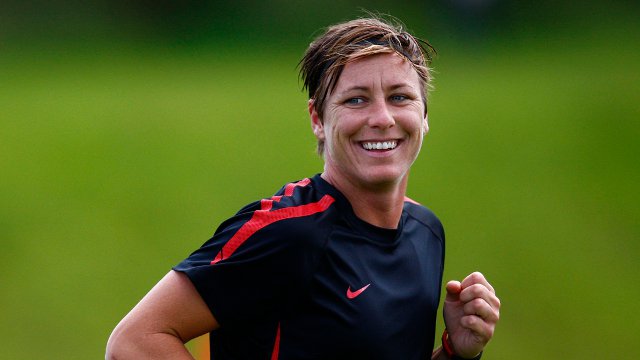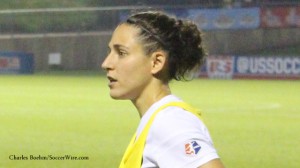TurfGate Reader: Women’s World Cup players take 2015 pitch fight to human rights tribunal

After many months of advocacy, entreaties and threats to FIFA drew little to no response, a group of the world’s top women’s soccer players ramped up their protest against the use of artificial-turf surfaces at the 2015 Women’s World Cup this week, filing a complaint with the Human Rights Tribunal of Ontario.
 Led by stars like Abby Wambach, Nadine Angerer and Vero Boquete, this effort seeks to force FIFA and 2015 WWC hosts the Canadian Soccer Association to reverse their plan to stage the entire tournament on synthetic turf at six venues across Canada.
Led by stars like Abby Wambach, Nadine Angerer and Vero Boquete, this effort seeks to force FIFA and 2015 WWC hosts the Canadian Soccer Association to reverse their plan to stage the entire tournament on synthetic turf at six venues across Canada.
Calling turf “a second-class surface” which fundamentally changes the nature of the game and poses “unique and serious risks of injury,” the application – not a formal lawsuit – calls its use at WWC 2015 “inherently discriminatory” in comparison to FIFA’s careful insistence on men’s World Cup matches being played on natural grass, and cites this as a violation of section 1 of the Ontario Human Rights Code.
+ READ the full text of the players’ complaint to the HRTO here
“These organizations appear prepared to force the top female soccer players in the world to play their preeminent event under inferior, dangerous and discriminatory conditions,” states the conclusion of the 16-page document filed Wednesday.
“Thus, the Applicants ask this tribunal to order CSA and FIFA to provide proper, lawful playing surfaces for FIFA Women’s World Cup Canada 2015.”
For now, this gambit by the players and their representatives to force FIFA and CSA to make an about-face on the turf issue looks like a long shot, an angle explored in depth by CanadianSoccerNews.com.
But it has quickly turned heads around the world, as some of the most famous faces in the women’s game step up to challenge the wealth and might of FIFA – and the battle that plays out in the media and court of public opinion might prove to be more important than the one being sought via legal action.
New York Times columnist Juliet Macur focused on this new development in an op-ed on Thursday, lambasting FIFA and CSA for “playing the world’s longest game of hot potato, without either of them addressing the women’s complaints. They’re trying to make it seem that neither of them is responsible for this mess.”
 Several other outlets have weighed in on, including Fox Soccer:
Several other outlets have weighed in on, including Fox Soccer:
The group bringing the action argues that the cost of temporarily equipping the six venues with natural grass shouldn’t be a factor. After consulting with a range of experts, they claim that the cost should be no more than $3 million in total. “It is a drop in the bucket in terms of FIFA’s coffers [reported to contain more than $1.4 billion in reserves]; Canada is one of the richest nations on earth,” said Hampton Dellinger, the lead lawyer on the case. “This is completely economically feasible.”
Hampton Dellinger, the attorney representing the players, said in a statement Wednesday that the players hoped to resolve the issue with FIFA and the CSA “through good faith negotiations rather than litigation,” but “have no choice” but to take legal action because FIFA has ignored them.
and the Fusion network’s Soccer Gods:
This isn’t just any suit. A group of over 40 players have been named as applicants with with a Human Rights Tribunal in Ontario. The stars have requested an expedited proceeding, hoping the matter will be settled by the end of the year. Presumably, that’s enough time to get Winnipeg, Edmonton, and the other venues to comply with a court order – assuming those sites don’t walk away from the event entirely. Varying reports put the cost of installing a natural field at between $500,000 and $1 million, per venue.
FIFA and CSA have been directed to respond to the players’ complaint by Oct. 9.
SoccerWire.com will have further coverage on this unique situation in the days and months ahead, including a Canadian perspective on the strengths, weaknesses and limitations of the players’ legal strategy.
—











